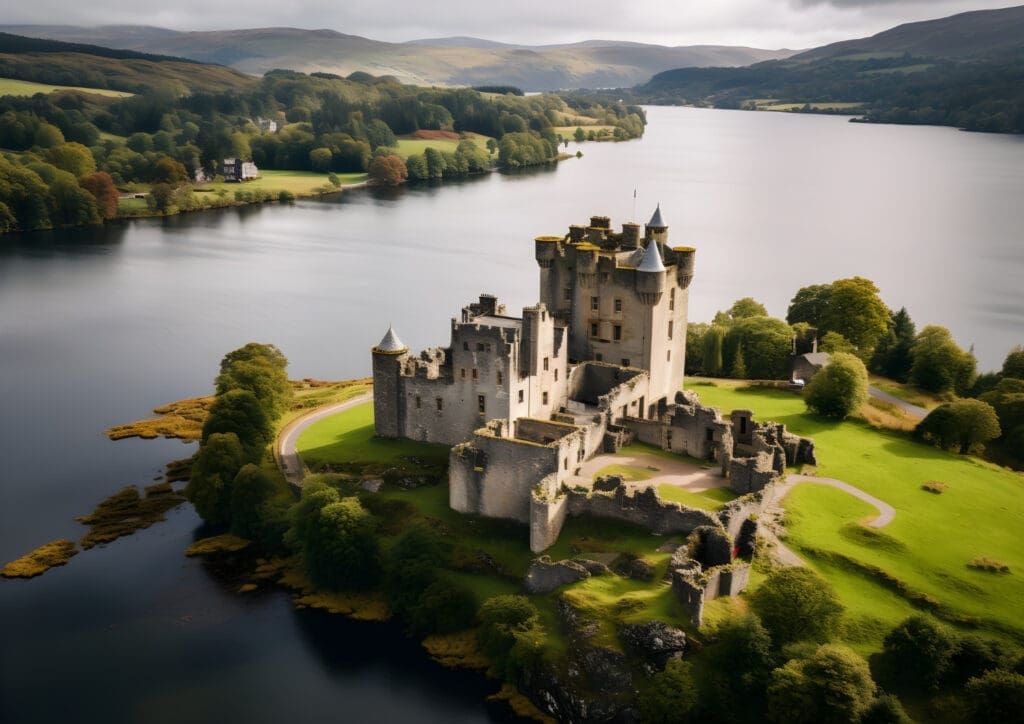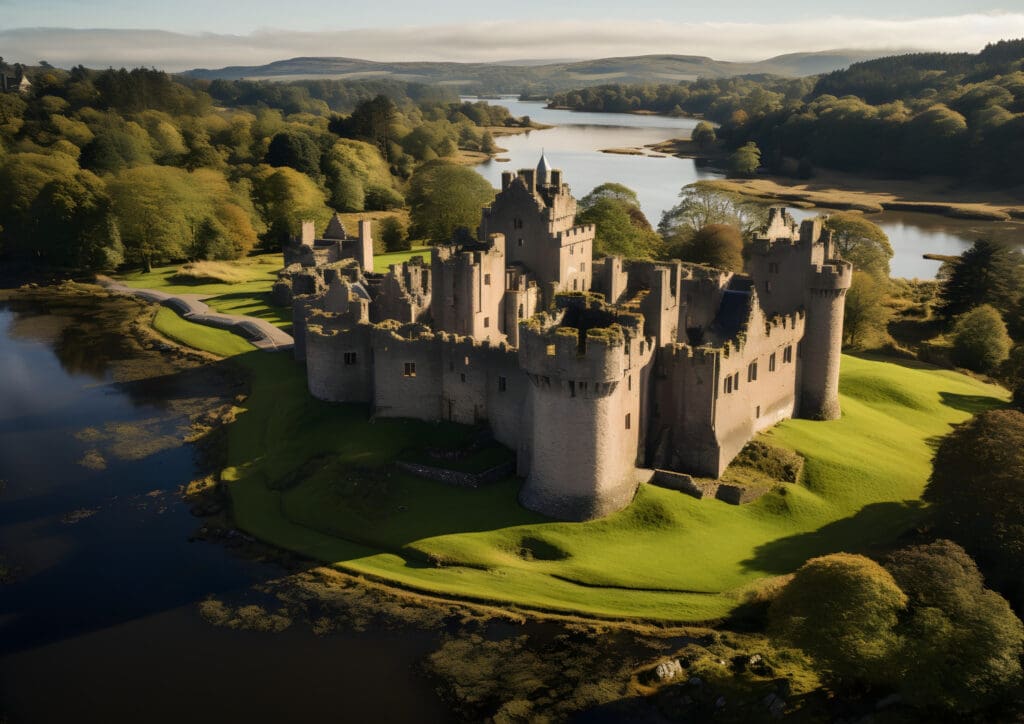The Kingdom of Ireland: King Henry VIII’s Declaration as the King of Ireland

Updated On: April 19, 2024 by Raghda Elsabbagh
As we delved into the captivating tapestry of Irish history, one chapter that really piqued our curiosity was King Henry VIII’s bold declaration as not just a king but THE King of Ireland. It was like stumbling upon an intricate puzzle — complex yet inviting.
So, armed with nothing more than sheer curiosity, we plunged deeper into this fascinating era. The findings were nothing short of extraordinary and proved instrumental in shaping the path that Ireland would tread subsequently. Strap in because we’re just getting started on this fascinating journey back to the Kingdom of Ireland!

Table of Contents
Overview of Ireland’s Political Situation Before Henry VIII’s Declaration
Alright, let’s paint a picture of Ireland before Henry VIII’s grand entrance onto the scene. Picture a patchwork of kingdoms and chieftains and a vibrant Celtic culture. Ireland was a land of rich traditions and fiercely independent people.
Before Henry VIII decided to throw his crown into the Irish ring, the island was not a unified entity. Instead, it was divided into various kingdoms, each ruled by its own local chieftain or king. These rulers held sway over their territories with varying degrees of power, sometimes squabbling among themselves and other times banding together to face common threats.
This decentralised political landscape made Ireland a tempting target for external powers seeking to expand their influence. And boy, did Henry VIII have his eye on the Emerald Isle.
Henry VIII’s Motivations for Asserting His Authority Over Ireland
Now, why on earth would Henry VIII, with all his royal responsibilities back home in England, bother himself with Ireland? Well, let me tell you, it wasn’t just a sudden whim.
Henry was a man of many ambitions, and expanding his realm was right up there on his to-do list. Ireland wasn’t just a quaint island across the sea; it represented an opportunity for Henry to bolster his own power and prestige.
By declaring himself King of Ireland, Henry wasn’t just grabbing a shiny new title for his collection. He was also asserting his authority over a land strategically positioned to enhance England’s influence in the broader geopolitical game. Plus, tapping into Ireland’s resources and trade potential would have economic benefits.
And let’s not forget about the religious angle. Henry’s break with the Catholic Church had stirred up quite the hornet’s nest, and Ireland, with its predominantly Catholic population, represented both a challenge and an opportunity for Henry to consolidate his control over matters of faith.
The Significance of the Tudor Conquest of Ireland
Ah, the Tudor conquest of Ireland—a tale as dramatic as any from the pages of history. Picture Henry’s forces sweeping across the Irish landscape, facing off against local resistance and forging alliances where they could.
The Tudor conquest wasn’t just about planting the English flag on Irish soil; it was about fundamentally reshaping the political and social landscape of the island. Henry’s declaration as King of Ireland wasn’t just a symbolic gesture; it was a concrete assertion of English authority over a land that had long danced to its own tune.
But make no mistake, the conquest was no walk in the park. It was marked by fierce resistance from Irish lords and clans who weren’t about to roll over and accept English rule without a fight. The Tudors faced challenges, setbacks, and outright rebellions as they sought to impose their will on the Emerald Isle.
Yet, despite the bloodshed and turmoil, the Tudor conquest of Ireland left an indelible mark on the island’s history. It set the stage for centuries of English dominance, shaping the course of Irish politics, culture, and identity in ways that continue to reverberate to this day.
Henry VIII’s Declaration as the King of Ireland
In 1542, King Henry VIII declared himself the King of Ireland, creating the Kingdom of Ireland and asserting English control over the island’s political affairs. Before, Kings and Queens from other places did not see him as an Irish king because he didn’t follow their rules about religion.

The Legal and Political Implications of the Declaration and the Creation of the Kingdom of Ireland
Now, let’s talk about what Henry’s grand proclamation actually meant in the grand scheme of things. When Henry slapped that “King of Ireland” label on himself, it wasn’t just for show. Oh no, it had some serious legal and political consequences.
Legally speaking, Henry’s declaration asserted his claim to sovereignty over Ireland, effectively bringing the island under the umbrella of the English crown. The creation of the Kingdom of Ireland established a new political entity under English rule. This meant that Irish laws, customs, and governance structures were now subject to Henry’s authority, whether they liked it or not.
This meant that the Irish monarchy, which Gaelic kings had ruled for centuries, was now under British control. Other Catholic monarchs in Europe did not recognise the title of King of Ireland, as it was created after Henry VIII had been excommunicated. However, this declaration solidified England’s control over Ireland and set the stage for centuries of English influence on the island. This had long-lasting effects on Irish history and would later contribute to conflicts and struggles for independence.
Politically, Henry’s move was a power play of epic proportions. By extending his reach across the Irish Sea, Henry aimed to cement England’s dominance in the region while also sending a clear message to any would-be challengers to his throne.
But here’s the kicker: Henry’s declaration wasn’t just about asserting control over Ireland; it was also a savvy strategic move in the broader game of European politics. By expanding his realm, Henry aimed to bolster England’s standing on the international stage, flexing his muscles for all to see.
Analysis of the Reactions of Irish Nobility and the General Populace
Now, let’s talk about how the folks back in Ireland reacted to Henry’s bombshell announcement. Spoiler alert: they weren’t exactly throwing a party in his honour.
The Irish nobility, who had long enjoyed a degree of autonomy under their local rulers, weren’t exactly thrilled about the prospect of English interference in their affairs. Many saw Henry’s declaration as a direct challenge to their authority, sparking resistance and rebellion in some quarters.
As for the general populace, well, let’s just say they weren’t exactly lining up to pledge their allegiance to the new King of Ireland. For many ordinary Irish folks, Henry’s declaration represented yet another chapter in a long history of English oppression and exploitation.
Comparison with Henry’s Other Acts of Sovereignty Consolidation, Such as the Act of Supremacy

Now, here’s where things get really interesting. You see, Henry’s declaration as King of Ireland wasn’t just a one-off power move; it was part of a larger pattern of sovereignty consolidation.
Take, for example, Henry’s famous Act of Supremacy, which declared him the supreme head of the Church of England. Sound familiar? That’s because it’s cut from the same cloth as his declaration as King of Ireland. Both acts were about centralising power, asserting control, and leaving no doubt as to who was in charge.
But here’s the twist: while Henry’s Act of Supremacy sparked fierce opposition from the Catholic Church and led to centuries of religious strife, his declaration as King of Ireland didn’t quite have the same impact. Sure, there were protests and rebellions, but Ireland’s relationship with England would take on its own unique flavour over the centuries.
Impact of Henry VIII’s Declaration
Let’s roll up our sleeves and dig into the aftermath of Henry VIII’s Declaration as King of Ireland. Henry VIII’s declaration had far-reaching consequences for the island nation, resulting in the unification of Ireland under English rule and sparking conflicts and unsettlement that would have lasting effects on Irish history. Get ready for a wild ride through the twists and turns of history!
Unification of Ireland Under English Rule
When King Henry VIII declared himself as the King of Ireland in 1542, it led to the unification of Ireland under English rule. This declaration created a separate political entity known as the Kingdom of Ireland and established English control over the island.
However, this also sparked rebellions and conflicts, such as the Desmond Rebellions, as some Irish people resisted English influence. The establishment of the Kingdom of Ireland laid the foundation for centuries-long English influence and control over Ireland.
Consequences on Ireland’s Governance Structure: Conflicts and Unsettlement

So, what happened in the immediate aftermath of Henry’s big announcement? Well, let’s just say it was a bit of a mixed bag.
The establishment of the Kingdom of Ireland by Henry VIII led to conflicts and unsettlement on the island. On the one hand, Henry’s declaration shook up Ireland’s governance structure like a medieval earthquake. Suddenly, local rulers found themselves answering to a distant king across the sea, and let’s just say they weren’t exactly thrilled about it. Rebellion simmered, resistance flared, and the whole island seemed to be on the brink of chaos. The English control over Ireland sparked rebellions like the Desmond Rebellions, as the native Irish opposed English rule.
But on the other hand, Henry’s declaration also laid the groundwork for a more centralised system of governance in Ireland. With English officials now calling the shots, Ireland’s political landscape began to take on a distinctly English flavour, for better or for worse.
Discussion of the Long-Term Effects on Anglo-Irish Relations
Now, let’s fast-forward a few centuries and examine the long-term effects of Henry’s declaration on Anglo-Irish relations. Spoiler alert: it’s complicated.
You see, Henry’s power play set the stage for centuries of tension and strife between England and Ireland. From rebellions and uprisings to political intrigue and cultural clashes, the relationship between the two countries has been anything but smooth sailing.
But here’s the thing: despite all the bloodshed and bitterness, there have also been moments of cooperation and camaraderie between England and Ireland. Whether it’s trading goods, sharing ideas, or just kicking back with a pint of Guinness, the ties that bind these two nations run deep.
Evaluation of Henry VIII’s Legacy in Ireland

Now, let’s take a step back and ask ourselves: what is Henry VIII’s legacy in Ireland? Was he a hero, a villain, or something in between?
Well, it’s a bit of a mixed bag, isn’t it? On the one hand, Henry’s declaration paved the way for centuries of English dominance in Ireland, leaving a lasting imprint on the island’s politics, culture, and identity. But on the other hand, his heavy-handed approach also fueled centuries of resentment and rebellion among the Irish people as they sought to gain independence. The legacy also includes a deep divide between Protestant and Catholic communities in Ireland, rooted in Henry VIII’s break with Rome during his quest for divorce from Catherine of Aragon.
So where does that leave us? Well, like any good history lesson, the legacy of Henry VIII’s Declaration as the King of Ireland is open to interpretation. Some may see him as a visionary leader who expanded England’s influence and brought order to a chaotic land, while others may see him as a tyrant who trampled over the rights of the Irish people.
But one thing’s for sure: love him or hate him, Henry VIII certainly left his mark on the Emerald Isle. And hey, isn’t that what history’s all about—leaving behind a legacy that’s as complex and multifaceted as the people who made it?
So there you have it—a closer look at Henry VIII’s Declaration as King of Ireland. It was a bold move with far-reaching implications, stirring up controversy and resistance along the way. But hey, that’s just how Henry rolled—always keeping things interesting!
FAQs
Who declared himself King of Ireland?
King Henry VIII, from the Tudor dynasty, declared himself the King of Ireland.
What changed after King Henry VIII’s declaration?
After his declaration, Irish independence ceased, and English reformation started in Gaelic Ireland, changing the Irish political entity.
How did this affect Gaelic rulers?
The royal title shifted to the British monarchy, affecting the Irish kingship and diminishing the power of Gaelic rulers.
Why was this change important for England?
This change was part of an effort by the Kingdom of England to expand its rule across different regions, including Lordship over Kingdoms like Leinster in Gaelic Ireland.
Did any resistance occur against this decision?
Yes, there were resistances like the Irish Rebellion, but they ended with a Protestant Ascendancy backed by Plantations during a series called Acts of Union.






